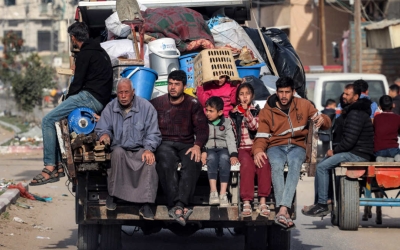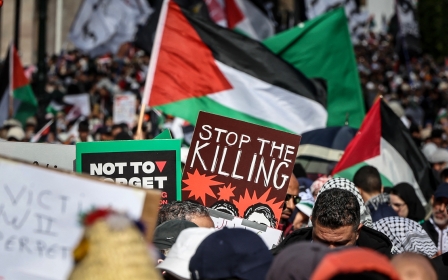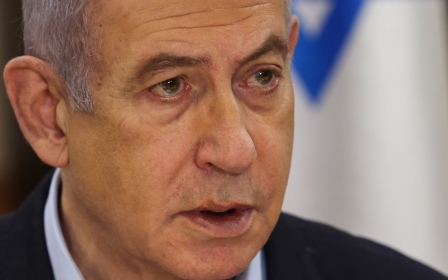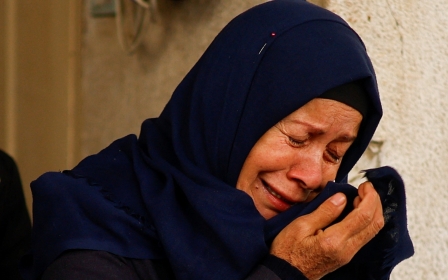War on Gaza: Families of captives travel to the Hague to urge Hamas ICC investigation

A group of Israelis whose relatives are being held captive by Hamas in Gaza have travelled to the International Criminal Court (ICC) in the Hague to file a complaint against the Palestinian group.
The delegation, organised by the Hostages and Missing Families Forum, said the complaint would "encompass taking hostages, enforced disappearance, crimes of sexual violence, torture, and more severe allegations".
One member of the delegation, Inbar Goldstein - whose sister Nadav was killed in Kibbutz Kfar Azza on 7 October - said they were travelling "to voice the cries of those whose voices aren't heard," according to Haaretz.
"We're travelling there to ensure that we're not just observing history as it unfolds, but rather write it in our own words," she added.
Speaking at Ben-Gurion Airport in Tel Aviv prior to their departure, another family member said they hoped this could see the arrest of Hamas leaders living abroad.
New MEE newsletter: Jerusalem Dispatch
Sign up to get the latest insights and analysis on Israel-Palestine, alongside Turkey Unpacked and other MEE newsletters
"We want to...make sure that the leaders of Hamas are taken into custody or that they cannot leave Qatar anymore and that this puts pressure on them to release the hostages," said Udi Goren, cousin of 41-year-old Tal Haimi, who was seized on 7 October.
Around 130 captives who were taken during the 7 October attack by Hamas are still being held captive in Gaza, according to Israeli officials.
The attack killed 1,140 people, almost 700 of whom were Israeli civilians, and saw around 240 people taken captive to Gaza, a number of whom were later freed mainly through negotiations.
Although Israel is not a member of the ICC and does not recognise its jurisdiction, prosecutor Karim Khan has said the court has jurisdiction over the events of 7 October.
He told Reuters earlier this week that an investigation was "being taken forward as a matter of the utmost urgency, with a view to bringing to justice those responsible."
Tensions with government
The families of the captives have been holding regular protests across Israel as disagreements grow over Prime Minister Benjamin Netanyahu's strategy for releasing them and the future of Gaza after the war ends.
Netanyahu has vowed to continue Israel's military offensive until "total victory" is secured, saying his country would achieve this "within months".
"We won't settle for less," he said last week, dismissing a ceasefire proposal by Hamas.
"Surrendering to Hamas's delusional demands ... will not only not lead to the release of the hostages, but will invite another massacre."

Since the attack, Israel has carried out a relentless air campaign and ground invasion of the Gaza Strip, killing more than 28,000 Palestinians - the majority women and children - while at least 65,000 have been wounded.
On Tuesday, South Africa made an urgent request to the International Court of Justice (ICJ) - a separate body from the ICC to which Israel is a party - to consider whether Israel's decision to extend its military operations in Gaza's southernmost city of Rafah required that the court use its power to prevent further breaches of the rights of Palestinians.
In its appeal to the ICJ, South Africa cited section 1 of Article 75 of the Rules of Court, which says the court "may at any time decide to examine proprio motu whether the circumstances of the case require the indication of provisional measures which ought to be taken or complied with by any or all of the parties".
Last month, the ICJ denied Israel's request to drop the case brought by South Africa, mandating that Israel halt any possible acts of genocide and secure proof of such actions.
The court also ordered Israel to prevent genocide against Palestinians, penalise any encouragement of it, immediately facilitate the entry of humanitarian aid to the population in Gaza, and provide a report within a month detailing the measures it has implemented in response to these directives.
More than 2,000 Palestinians have been killed since the ICJ told Israel to do its best to prevent acts of genocide against Palestinians in Gaza.
Middle East Eye delivers independent and unrivalled coverage and analysis of the Middle East, North Africa and beyond. To learn more about republishing this content and the associated fees, please fill out this form. More about MEE can be found here.




